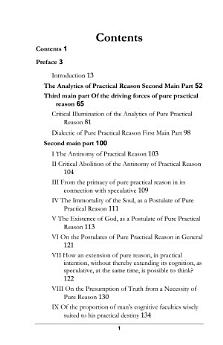Critique of Practical Reason
thg 5 2024 · Minerva Heritage Press
Sách điện tử
108
Trang
family_home
Đủ điều kiện
info
reportĐiểm xếp hạng và bài đánh giá chưa được xác minh Tìm hiểu thêm
Giới thiệu về sách điện tử này
A new translation of Immanuel Kant's famous "Critique of Practical Reason", one of his three core critiques, from the original German manuscript first published in 1788. This new edition contains an afterword by the translator, a timeline of Kant's life and works, and a helpful index of Kant's key concepts and intellectual rivals. This translation is designed for readability, rendering Kant's enigmatic German into the simplest equivalent possible, and removing the academic footnotes to make this critically important historical text as accessible as possible to the modern reader. Kants 1788 Critique of Practical Reason is the second of his major triad of critical philosophical critiques. It builds upon his Pure Reason and the Groundwork for the Metaphysics of Morals in delineating his theory of moral justification. The Critique of Pure Reason answers the question, "What can I know?", while Practical Reason answers "what should I do?". Practical Reason primarily concerns the relationship of Reason to morality. It is the Imperative in the Categorical Imperative. Morality is not a feeling or perception, but a reality to submit to. Kant's Practical Reason is a critical text to understand the view of Reason as Teleological, a uniquely German view, in contrast to the English Empiricist view (Hume, Locke, and Descartes) view is that Reason is the slave of the passions and can tell us nothing about morality and ethics. The teleological view, which is found clearly and explicitly in Kant and all German Idealists after him, is both normative and descriptive, or in other words, Imperative. The entire Frankfurt school of thought operates off of a version of this metaphysical view, all the way to Theodor W. Adorno's Aesthetics which is rooted in a Teleological view of reason.
Giới thiệu tác giả
Immanuel Kant (1724-1804) was a German philosopher whose work in epistemology, ethics, and metaphysics shaped the course of Western philosophy. In his landmark work, Critique of Pure Reason, Kant proposed "transcendental idealism," asserting that human knowledge is limited by the mind's structures, which mediate our understanding of reality. This "Copernican revolution" in philosophy argued that we can only know phenomena (appearances) and not noumena (things-in-themselves). In Critique of Practical Reason, Kant introduced the "categorical imperative," a foundational principle in ethics that calls for actions to be universally applicable. Kant's focus on autonomy, moral duty, and rationality laid the groundwork for modern ethical and political thought, and his ideas continue to influence fields such as philosophy, law, and cognitive science, positioning him as a central figure in the Enlightenment.
Xếp hạng sách điện tử này
Cho chúng tôi biết suy nghĩ của bạn.
Đọc thông tin
Điện thoại thông minh và máy tính bảng
Cài đặt ứng dụng Google Play Sách cho Android và iPad/iPhone. Ứng dụng sẽ tự động đồng bộ hóa với tài khoản của bạn và cho phép bạn đọc trực tuyến hoặc ngoại tuyến dù cho bạn ở đâu.
Máy tính xách tay và máy tính
Bạn có thể nghe các sách nói đã mua trên Google Play thông qua trình duyệt web trên máy tính.
Thiết bị đọc sách điện tử và các thiết bị khác
Để đọc trên thiết bị e-ink như máy đọc sách điện tử Kobo, bạn sẽ cần tải tệp xuống và chuyển tệp đó sang thiết bị của mình. Hãy làm theo hướng dẫn chi tiết trong Trung tâm trợ giúp để chuyển tệp sang máy đọc sách điện tử được hỗ trợ.








